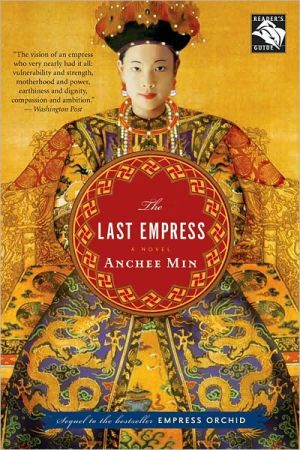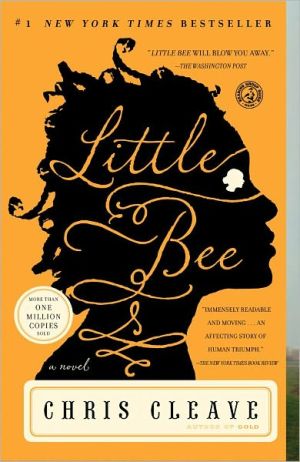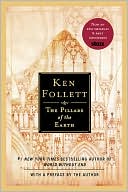The Last Empress
The last decades of the nineteenth century were a violent period in China’s history, marked by humiliating foreign incursions and domestic rebellions and ending in the demise of the Ch’ing Dynasty. The only constant during this tumultuous time was the power wielded by one woman, the resilient, ever-resourceful Tsu Hsi—or Empress Orchid, as readers came to know her in Anchee Min’s critically acclaimed, best-selling novel covering her rise to power.\ The Last Empress is the story of Orchid’s...
Search in google:
The last decades of the nineteenth century were a violent period in China’s history, marked by humiliating foreign incursions and domestic rebellions and ending in the demise of the Ch’ing Dynasty. The only constant during this tumultuous time was the power wielded by one woman, the resilient, ever-resourceful Tsu Hsi—or Empress Orchid, as readers came to know her in Anchee Min’s critically acclaimed, best-selling novel covering her rise to power.The Last Empress is the story of Orchid’s dramatic transition from a strong-willed, instinctive young woman to a wise and politically savvy leader who ruled China for more than four decades. In this concluding volume Min gives us a compelling, very human leader who assumed power reluctantly and sacrificed all to protect those she loved and an empire that was doomed to die.The Washington Post - Donna RiftkindFor every generation's dream of China there seems to be a corresponding dream of Tzu Hsi. She was a dragon lady for late-19th-century Westerners who considered that image useful for their colonial aspirations. Today's Tzu Hsi, as Min's revisionist pair of novels imagines her, suits a contemporary Western audience as the vision of an empress who very nearly had it all: vulnerability and strength, motherhood and power, earthiness and dignity, compassion and ambition.
\ Publishers WeeklyMin's Empress Orchidtracked the concubine Orchid's path to becoming Empress Dowager Tzu Hsi; this revisionist look at her long years behind her son Tung Chih's throne (1863–1908) won't disappoint Orchid's fans. Recounted through Tzu Hsi's first-person, the early chapters encompass her trials as a young "widow," as co-regent with the late emperor's wife and as a mother. An engaging domestic drama gives way to pedestrian political history; Tzu Hsi lectures like a popular historian on palace intrigue, military coups, the Boxer Rebellion and conflicts with Russia, France and Japan. Though tears flow, there is little passion (save Tzu Hsi's erotic but chaste longing for Yung Lu, commander of the emperor's troops). Min's empress adopts a notably modern psychologizing tone ("How much was Guang-hsu affected when he was wrenched from the family nest?"), earthy language ("You are the most wretched fucking demon I know!") and notes of historical prescience (including what "future critics" will say). Min attacks the popular conception of Tzu Hsi as a corrupt, ruthless, power-hungry assassin, but the results read less like a novel than a didactic memoir. (Mar.)\ Copyright 2006 Reed Business Information.\ \ \ \ \ Library JournalThree years after the publication of Min's best-selling Empress Orchidcomes the sequel to the life of Lady Yehonala, a.k.a. the Dowager Empress, or the last empress of China. Min picks up Orchid's story from the time of her mother's death and takes readers through the empress's own death in 1908. Departing from the stereotype of Orchid as the "dragon lady" empress, Min uses first-person narration to portray her as a caring mother to Emperor Tung Chih and her nephew, Emperor Guang-hsu. The softness of Orchid's persona is revealed in her relations with her eunuchs, An-te-hai and Li-Lien-ying, while her strength is played out in the politics of the period and in her ability to survive the hardships of the Boxer Rebellion. As seen in the author's previous works (e.g., Becoming Madame Mao), Min consistently blends meticulous historical research with firsthand knowledge of Chinese culture and the female perspective to bring to readers a unique look at women in Chinese history. Essential for all fiction collections. [See Prepub Alert, LJ11/15/06.]\ —Shirley N. Quan\ \ \ Kirkus ReviewsIn this sequel to her historical novel Empress Orchid (2004), Min tells the story of late-19th-century China's crumbling empire, from the point of view of the country's much-vilified final empress. Two years after the death of Orchid's husband, she and his "first wife," Nuharoo, are sharing the upbringing of the new Emperor, Orchid's seven-year-old son Tung Chih, and acting as ruling co-regents until he grows up. Orchid is overseeing a nation heavily in debt and slowly losing control of its provinces to western nations and Japan. Orchid is selflessly devoted to governing China. She does not allow herself a relationship with the one man she genuinely loves, focusing instead on preparing Tung Chih for his responsibilities with a single-mindedness that undermines the typical mother-son relationship. When Tung Chih, who hates his duties, dies in his 20s of a venereal disease, Orchid adopts her sister's three-year-old son Guang-hsu and makes him emperor. Although Orchid loves Guang-hsu, her sense of political responsibility again overrides maternal feelings. The sensitive, sweet little boy grows into an indecisive, insecure ruler. Although recognizing the mistakes Guang-hsu and his advisors are making, Orchid often goes along in order to keep his sense of authority intact. By the time of the Boxer Rebellion, she has lost control over her ministers, even while she is being vilified in the Western press as the "Dragon Lady." She wants reform and feels camaraderie with Robert Hart, who keeps China financially afloat for decades. But most of all, she wants to keep China unified, a goal that proves impossible. The great swatches of historical detail will enlighten readers who generally view historyfrom a Western perspective, but with Orchid so busy explaining herself, the human story of a woman who denies her instincts never quite emerges.\ \








